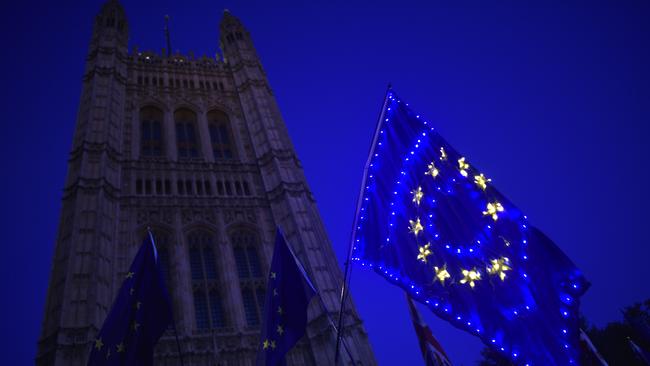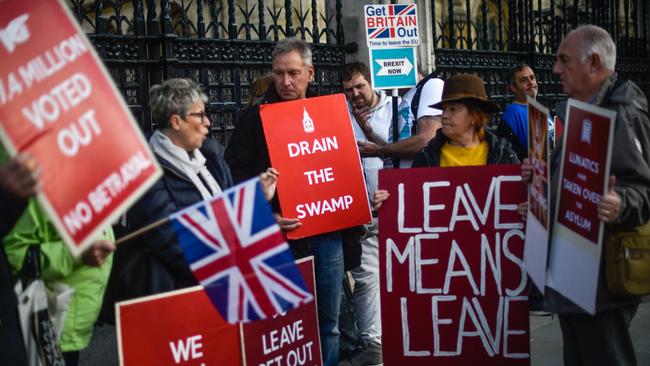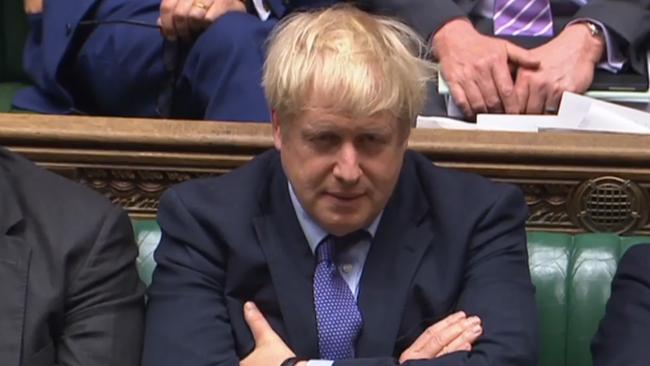
MORE: Boris loses crucial vote on deal timetable
My answer to the question was simple: our fascination then and now is with freedom.
When the most fundamental freedom in a democracy, the sovereign right to determine your own laws, comes up for grabs, which is what Brexit is, why wouldn’t Australians be interested? More than just a fascination, Brexit became a rare celebration because, these days, right across the West, a win for freedom is as rare as a conservative ABC host in Ultimo or Southbank.
Brexit matters because we are in the midst of writing our own chapter to the long story of Western civilisation. Sure, many of our politicians talk about liberal values — meaning our liberty — but seriously, which federal politician can lay claim to a serious win for liberal values in the past decade?
For example, in Australia right now, the media has united to fight for your right to know important things that the Morrison government doesn’t want you to know. We want to inform you about details of abuses in aged care, Australian Taxation Office bullies and a government plan to spy on its own people. Less than a decade ago, we were fighting Labor’s thinly veiled attempt to regulate media critics.
We will keep fighting for freedom of the press because we are not just in the media business, we are in the democracy business: our role, as a newspaper, is to educate the public because a free and democratic society depends on an educated people.
Just as others are watching this battle for greater press freedom in this country, we, as Australians, should be deeply invested in the future of other liberties across the West.
That is why Brexit matters here. Brexit tells a story of democracy in crisis, crumbling governance and a deepening chasm between different groups of people. More than three years after the British people voted to leave the EU, Westminster remains paralysed.

Last weekend’s much-touted Super Saturday, when the House of Commons sat for the first time on the weekend since uniting over the Falklands War in 1982, fizzed into yet another shameful opportunity to deliberately thwart the 2016 referendum result. And yesterday Speaker John Bercow signalled he would refuse another vote because “it would be repetitive and disorderly to do so”. Is this man’s swan song an audition for one of JK Rowling’s Dementors?
Westminster’s repetitive snubbing of the people’s vote confirms why Brexit happened. A noisy, confident and dominant political class, people who are the daily practitioners of democracy, are increasingly removed from the values, interests and experiences of a large swath of grassroots constituents of democracy. British commentator and author David Goodhart calls this last group the hidden majority. Scott Morrison calls them the “quiet Australians”.
The divide, similar in both countries, is between what Goodhart calls a group of people called the “Anywheres” and another group called the “Somewheres”.
The Anywhere people are well-educated, mostly professional people whose sense of self comes from their own achievements. Theirs is mostly a portable individualistic identity, not rooted to place or people; this group of roughly 20-25 per cent of the population sees the world from anywhere.
By contrast, people whom Goodhart calls Somewheres have an identity ascribed by place and people, with matching values of familiarity, security and stability. Though there is a wide spectrum from achieved identity to ascribed identity, most in this latter group see the world from somewhere, and the places they live and work are changing fast in the face of globalisation, tech explosions and immigration.
Brexit happened because politics today means a cabinet table that is largely a homogenous group of Anywheres, no longer a broader range of people, with varied lived experiences and values to match, mostly university graduates claiming to know better what other people want.
This cosy environment makes groupthink and confirmation bias inevitable among Anywheres. This political order, as Goodhart says, has lost its purchase on the fundamental challenge today of bridging the values gap between Anywheres and Somewheres. Hence, Westminster’s risible refusal to come together to deliver Brexit.

Brexit transcends the tabled issue of EU membership. It is a warning shot across the bows that Western politics, and therefore democracy, is shifting on its axis.
During a recent podcast interview with former deputy prime minister John Anderson, Goodhart, the founder and former editor of the left-liberal Prospect magazine, explained the new divide. He said that while traditional socio-economic issues about state versus market, the level of public spending, how to divide the public pie and who pays for it, remain the bread and butter of politics, “they’ve been joined by, and even overshadowed … by … sociocultural issues, value issues, issues to do with security and identity, and borders and boundaries, who we are, issues of belonging, and meaning”.
Brexit is the democratic marker for values of national sovereignty and democratic rule rather than subservience to the commanding heights of transnationalism. It is the rightful, inevitable push back by people who do not have the resources to avoid the social challenges of high immigration, people who are sceptical of some social changes. Brexit is a democratic assertion of national borders over open-slather immigration, and a reminder that a base level of shared values is necessary for cohesion.
Goodhart pointed to family policies as just one of many examples of the rift between Anywheres and Somewheres. Most family policies are aimed at making it as easy as possible for both parents to spend as little time in the family as possible. “But most people want it made easier for one parent, usually but not always the mother, to spend time at home when children are very young and for the tax system to make it possible to do that,” he said.
Instead of respecting different choices, the shallow liberalism of Anywheres seeks to enforce a particular Anywhere world view.
This cultural divide presages a governance challenge that is set to become worse in modern democracies such as Australia.
Goodhart points to the massive explosion in university education — a place that pumps out Anywheres — while apprenticeships and vocational training have been neglected.
“You would expect a society with a much larger proportion of graduates to produce a society that is more intelligent, more tolerant and more liberal-minded,” Goodhart said.
“But over the last generation we have become less tolerant, and less generous, much quicker to judge … The expansion of higher education, far from making us a more tolerant society, seems to have made us a much harder society to govern.”
Brexit is evidence that a values divide is harder to resolve than socio-economic debates. While the centre-right has moved left on economics, the left will not budge an inch on its rigid cultural agenda. Hence, at the time of writing, Westminster has still failed to deliver Brexit to the hidden majority who voted to leave the EU.
Even if the House of Commons passes the withdrawal agreement this week, the long tedious road to Brexit remains a powerful reminder that, as Goodhart said, we need a new generation of politicians able to mend the divisions between the Somewheres vs Anywheres.




A year ago, when British historian Robert Tombs was in Australia to speak about the unfolding story of Western civilisation, one that includes the ravaging of continents, the burning of heretics, the atomic bomb and the Reformation, the Enlightenment, democracy, human rights and capitalism, he asked me in that soft, polite English way, why on earth are Australians so damn interested in Brexit? No matter where he went, he noticed that people here had a curious fascination with a vote by 17.4 million Brits to leave the EU.